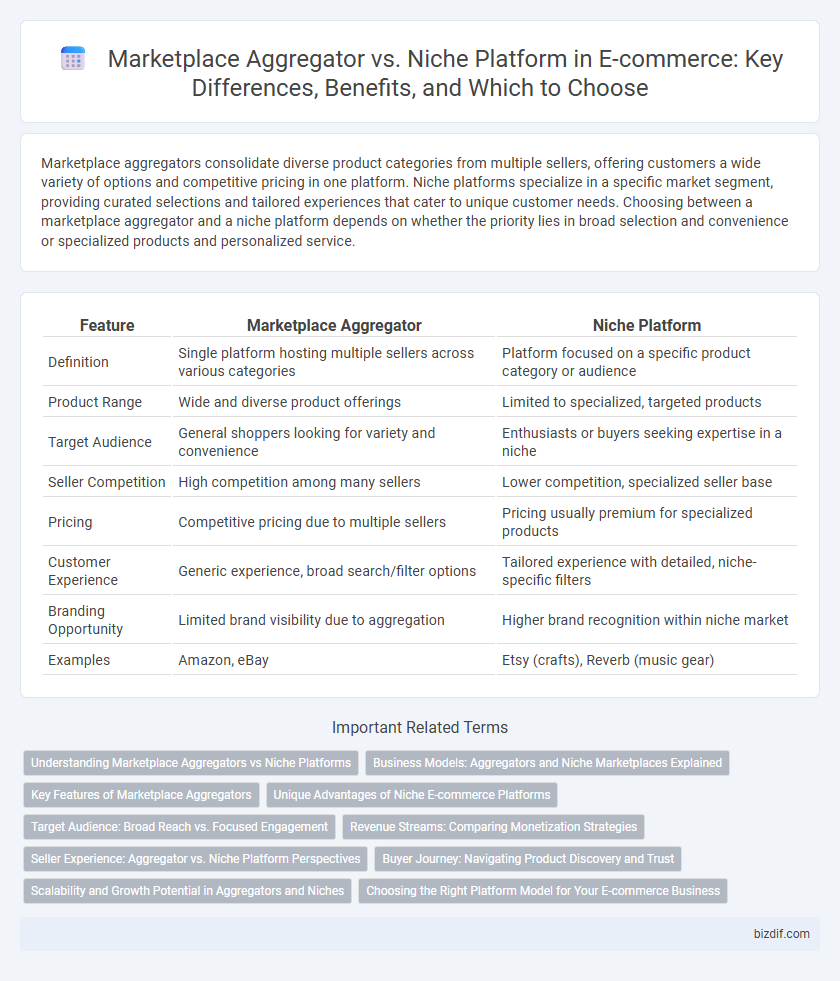Marketplace aggregators consolidate diverse product categories from multiple sellers, offering customers a wide variety of options and competitive pricing in one platform. Niche platforms specialize in a specific market segment, providing curated selections and tailored experiences that cater to unique customer needs. Choosing between a marketplace aggregator and a niche platform depends on whether the priority lies in broad selection and convenience or specialized products and personalized service.
Table of Comparison
| Feature | Marketplace Aggregator | Niche Platform |
|---|---|---|
| Definition | Single platform hosting multiple sellers across various categories | Platform focused on a specific product category or audience |
| Product Range | Wide and diverse product offerings | Limited to specialized, targeted products |
| Target Audience | General shoppers looking for variety and convenience | Enthusiasts or buyers seeking expertise in a niche |
| Seller Competition | High competition among many sellers | Lower competition, specialized seller base |
| Pricing | Competitive pricing due to multiple sellers | Pricing usually premium for specialized products |
| Customer Experience | Generic experience, broad search/filter options | Tailored experience with detailed, niche-specific filters |
| Branding Opportunity | Limited brand visibility due to aggregation | Higher brand recognition within niche market |
| Examples | Amazon, eBay | Etsy (crafts), Reverb (music gear) |
Understanding Marketplace Aggregators vs Niche Platforms
Marketplace aggregators consolidate diverse product categories from multiple sellers, offering extensive variety and competitive pricing, ideal for broad consumer reach. Niche platforms specialize in specific product segments, providing curated selections and targeted marketing that enhance brand loyalty and customer experience. Choosing between the two depends on business goals, product diversity, and target audience preferences in the e-commerce landscape.
Business Models: Aggregators and Niche Marketplaces Explained
Marketplace aggregators consolidate multiple niche platforms into a single, comprehensive e-commerce hub, enabling broader product variety and streamlined consumer access. Niche marketplaces focus on specialized categories or target audiences, offering tailored experiences and curated selections that drive customer loyalty. The aggregator model leverages scale and cross-selling opportunities, while niche platforms emphasize depth, expertise, and community-driven engagement.
Key Features of Marketplace Aggregators
Marketplace aggregators consolidate multiple sellers and product categories into a single platform, offering diverse inventory and competitive pricing that attract a broader customer base. They provide advanced search filters, integrated payment systems, and unified customer support to streamline the purchasing experience. Unlike niche platforms, marketplace aggregators leverage extensive data analytics to optimize product recommendations and inventory management across various segments.
Unique Advantages of Niche E-commerce Platforms
Niche e-commerce platforms offer unique advantages by delivering tailored shopping experiences that cater specifically to targeted customer segments, enhancing user engagement and loyalty. These platforms provide specialized product selections and expert knowledge, which increase conversion rates and customer satisfaction compared to broad marketplace aggregators. Their focused approach allows for more effective marketing strategies and stronger community-building around specific interests or industries.
Target Audience: Broad Reach vs. Focused Engagement
Marketplace aggregators serve a broad target audience by offering a wide range of products across multiple categories, maximizing reach and attracting diverse customer segments. Niche platforms concentrate on a specific market or product category, enabling deeper engagement and tailored experiences for a focused and loyal customer base. This targeted approach often results in higher conversion rates and stronger brand affinity within specialized communities.
Revenue Streams: Comparing Monetization Strategies
Marketplace aggregators generate diverse revenue streams through commissions on sales, advertising fees, and subscription models, leveraging high traffic volume and product variety to maximize profitability. Niche platforms focus on specialized market segments, monetizing through premium membership fees, targeted advertising, and exclusive product placements, which foster customer loyalty and higher conversion rates. Revenue diversification in marketplace aggregators contrasts with the specialized, value-driven monetization approaches of niche platforms, impacting scalability and customer engagement strategies.
Seller Experience: Aggregator vs. Niche Platform Perspectives
Marketplace aggregators provide sellers with broad exposure across multiple product categories, simplifying inventory management through unified dashboards and integrated analytics. Niche platforms offer specialized tools tailored to specific industries, enhancing seller expertise and target audience engagement with customizable storefronts and focused marketing support. Sellers benefit from aggregators' scale and convenience, while niche platforms deliver deeper customer insights and higher conversion potential within specific market segments.
Buyer Journey: Navigating Product Discovery and Trust
Marketplace aggregators streamline product discovery by offering diverse options across multiple categories, allowing buyers to compare and select efficiently. Niche platforms build trust through specialized expertise and tailored experiences, fostering loyalty within targeted customer segments. Navigating between broad selection and focused curation influences buyer confidence and decision speed in the e-commerce journey.
Scalability and Growth Potential in Aggregators and Niches
Marketplace aggregators offer significant scalability by consolidating multiple vendors across diverse product categories, enabling rapid expansion and access to a broad customer base. Niche platforms, while limited in scope, provide deep specialization and targeted marketing, fostering strong brand loyalty and higher conversion rates within specific segments. Aggregators excel in growth potential through network effects and cross-selling opportunities, whereas niche platforms achieve sustainable growth by optimizing user experience and expertise in focused markets.
Choosing the Right Platform Model for Your E-commerce Business
Choosing the right e-commerce platform model depends on your business goals and target audience. Marketplace aggregators offer broad product variety and access to a large customer base, ideal for businesses seeking high visibility and diverse sales channels. Niche platforms provide specialized audiences and tailored features, best suited for brands aiming to build strong customer loyalty within specific market segments.
Marketplace Aggregator vs Niche Platform Infographic

 bizdif.com
bizdif.com